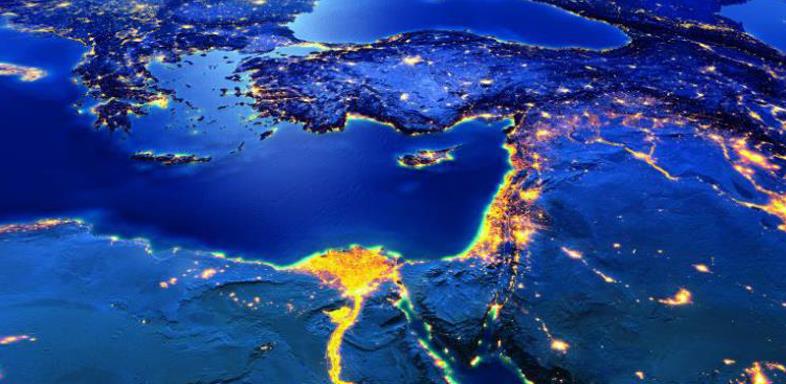The countries of the region must now recognize the looming dangers that await them in thefuture. The way forward is to establish strong alliances in the fields of security, defense, economy, and development. Türkiye, Baghdad, and Damascus are on the verge of forming a trilateral alliance under the name of the Tigris-Euphrates Alliance. This initiative should be expanded. Why not an Eastern Mediterranean Alliance, for instance? Egypt, Lebanon, Jordan, Türkiye, Syria, Cyprus, Tunisia, Libya, Morocco, and Algeria should come together to form such an alliance.
Gaza, Lebanon—Now Egypt and Jordan
Readers who have been following this column will remember that since the beginning of theGaza war, I have persistently argued—and even cried out—that Israel’s occupation andaggression would not be confined to Gaza alone, but that all the countries in the region wereat risk.
Indeed, after Gaza, Israel went on to occupy parts of Lebanon and Syria. But it did not stop there; it also carried out airstrikes in Yemen, Iraq, and Iran.
Now, U.S. President Trump wants to forcibly relocate Palestinians from Gaza to Egypt andJordan. Despite their refusal, he insists, “They will take the Palestinians, they will take them.” This is, in fact, a statement of threat.
The solution lies in unity, not compromise
Can you fathom the idea that nearly 2 million Palestinians will be deported to Jordan andEgypt, while Gaza is annexed by Israel? Let me emphasize that this desire for expulsion is not limited to Gaza alone; it also includes Palestinians in the West Bank.
I believe Egypt and Jordan are engaging in negotiations in an attempt to relieve the pressureimposed by the U.S. and Israel, thinking that they can prevent the arrival of 2 million refugeesinto their countries. Lebanon, too, had reconciliation talks with France and the U.S., yet it failed to prevent the occupation and devastation of its land.
These countries must understand that Israel never abandons its objectives—it merelypostpones them and implements them over time.
Israel’s theopolitical goal of the Promised Land has now transformed into a geopoliticalobjective for both Evangelical factions within the U.S. and Zionist Jews. This means thatIsrael’s once-covert expansionist and occupationist ambitions have now become an officialmilitary project. As a result, the Pentagon, Tel Aviv, and the White House are draftingmedium- and long-term strategic plans for our region based on this utopian vision.
Under these circumstances, sitting down with Israel and the U.S. to negotiate or seekcompromise will not prevent occupation and destruction. The only way to stop this is throughregional alliances and broad coalitions. Nothing but a unified regional front can counterIsraeli/U.S. expansionism.
Who is next after Egypt and Jordan?
If Egypt and Jordan accept the exiled Palestinians, they will be making one of the greatestmistakes in history. Not only will they face economic and social crises within their owncountries, but by emptying Palestinian lands and creating new spaces for Israel, they will alsobecome unforgivable figures in the Islamic world. This decision will ignite internalopposition, chaos, and unrest, while also damaging their alliances and diplomatic relationswith other nations. Ultimately, both countries will be dragged into serious instability.
This instability will serve the interests of Israel and the U.S., providing them with a pretextfor intervention under the guise of “security concerns.” I would be surprised if they have not already devised plans to occupy parts of Egypt’s Sinai Peninsula and Jordan’s border withIsrael, citing the need for buffer zones.
Believe me, this dark scenario will not stop here. Next, the U.S. will pressure Saudi Arabia tomeet Israel’s energy demands—and if it refuses, it will face threats such as asset freezes, sanctions, tariffs, and the withdrawal of protective security agreements.
Syria’s new government will be forced to cede the Golan Heights and the Hermon region, where newly occupied water resources lie, to Israel. If it refuses to surrender these already de facto occupied territories, it will be met with expanded military intervention, diplomaticisolation, and economic sanctions, with its leadership potentially labeled as terrorists.
Next, Lebanon’s newly emerging state will become a target. They will seek to expandoccupation in its southern territories under the pretext of creating buffer and safe zones.
In Cyprus, there will be pressure to establish more military bases to bolster Israel’s security in the Eastern Mediterranean, while Türkiye will face economic threats if it does not normalizerelations with Israel.
In short, just as they did not stop in Gaza and Lebanon, they will not stop in Egypt and Jordan either.
Think about it—Trump wanted to acquire Greenland, turn Canada into a U.S. state, seizecontrol of the Panama Canal, and meddle in the internal politics of Germany and the UK. Do you really believe that a U.S. administration capable of such ambitions would refrain fromtaking similar actions in the Middle East?
Why not an eastern Mediterranean alliance?
The countries of the region must now recognize the dangers that lie ahead. The way forwardis to establish strong alliances in the fields of security, defense, economy, and development. We must bring to the forefront the interlocking rings theory that I mentioned in my previousarticle. Türkiye, Baghdad, and Damascus are on the verge of forming a trilateral allianceunder the name of the Tigris-Euphrates Alliance. This initiative must be expanded.
Why not an Eastern Mediterranean Alliance, for instance? Egypt, Lebanon, Jordan, Türkiye, Syria, Cyprus, Tunisia, Libya, Morocco, and Algeria should come together to form such an alliance. Additionally, European countries whose relations with the U.S. are rapidlydeteriorating could also be included—Spain, Italy, Malta, Greece, and even France.
The ancient nations of Mediterranean civilization can leverage their shared history andcultural ties to counter the expansionist ambitions of the U.S. and Israel.
Source: https://aja.ws/z73kub


